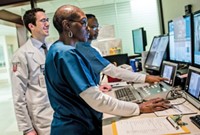Advertisement
Grab your lab coat. Let's get started
Welcome!
Welcome!
Create an account below to get 6 C&EN articles per month, receive newsletters and more - all free.
It seems this is your first time logging in online. Please enter the following information to continue.
As an ACS member you automatically get access to this site. All we need is few more details to create your reading experience.
Not you? Sign in with a different account.
Not you? Sign in with a different account.
ERROR 1
ERROR 1
ERROR 2
ERROR 2
ERROR 2
ERROR 2
ERROR 2
Password and Confirm password must match.
If you have an ACS member number, please enter it here so we can link this account to your membership. (optional)
ERROR 2
ACS values your privacy. By submitting your information, you are gaining access to C&EN and subscribing to our weekly newsletter. We use the information you provide to make your reading experience better, and we will never sell your data to third party members.
Pharmaceuticals
Merck Joins Forces With Harvard Researchers For Drug Discovery
by Lisa M. Jarvis
September 24, 2007
| A version of this story appeared in
Volume 85, Issue 39
In an agreement being called "an innovative model for industry/academic partnerships," researchers from Harvard Medical School and Merck & Co.'s Boston R&D center are teaming up to accelerate research in oncology and central nervous system disorders. Six HMS labs will receive funding from Merck, and scientists from both organizations will work together in the two therapeutic areas.
Individual academic researchers or projects routinely receive funding from drug companies, but the Merck agreement with Harvard is unique in that it involves multiple labs working in specific therapeutic areas, says Katherine Gordon, director of business development at HMS.
According to Gordon, the pact with Merck represents one route academia is taking to translate basic knowledge about the biology and chemistry of a disease into viable drug candidates. Though the agreement focuses on basic research, the parties expect it will lead to products.
For HMS, the deal is also a way to advance its science in a challenging funding environment. Earlier this month, Harvard handed out the first round of grants through its new Technology Development Accelerator Fund, established to develop promising life sciences ideas to a point where industry will take interest.
For Merck, the collaboration bolsters activities at its Boston lab, which opened in 2004.



Join the conversation
Contact the reporter
Submit a Letter to the Editor for publication
Engage with us on Twitter